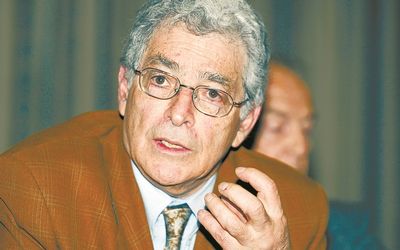
Arthur
Chaskalson, a judge and human rights
lawyer, was South Africa’s most senior judge for a decade
after apartheid’s demise. He was President of the Constitutional Court of South
Africa and Chief Justice of South Africa. He also represented Nelson Mandela in
the infamous Rivonia Trial.
‘Chaskalson was a tenacious, creative and hugely effective legal
combatant in the anti-apartheid struggle in South Africa,’ recalls PIAC chief executive,
Ed Santow.
‘I’ve always thought that it’s important to have heroes, and Arthur
Chaskalson was certainly a real hero of mine. He was also a truly lovely
person, interested in young lawyers and contemporary issues, and also very
humble.
In June 2000, Justice Chaskalson was the guest of honour at a dinner
organised by PIAC’s Andrea Durbach and then partner at Freehills, Julian Block.
Mr Chaskalson reminded his
audience that night of the lessons to be learnt from South Africa’s experience
of apartheid.
‘We
are here to demonstrate our support of PIAC and to affirm the importance of its
work,’ Mr Chaskalson said.
‘There
are many judges and lawyers at tonight’s dinner and that is appropriate, for
courts are the institutions to which people in democratic societies turn for
the protection of their rights, and no one has greater responsibility for
promoting and protecting human rights than judges and lawyers. If that protection is lacking, if
institutions fail, the consequences can be catastrophic. This is what happened under apartheid
in South Africa, and that history needs to be told and retold, for it is what
could happen in any country where there is no respect for human rights and no
control over the exercise of public and private power.
‘Lawyers
must act fearlessly in the interests of their clients, uphold the cause of
justice and be willing to protect fundamental freedoms and human rights. The independence of the profession is
tied to these important duties, which can only be performed properly if that
independence is protected against interference from government or any other
quarter.
‘The
idealism of the professional codes reflects important values that have always
been part of the legal profession. This is an essential counterweight to the
individualism and materialism that coexist within it. There are, however, contradictions between these aspirations
and the way the legal profession usually functions. We need to acknowledge that
law has become increasingly complicated and as lawyers respond on behalf of
their clients to changing situations, it becomes more refined and less
accessible to ordinary people. Although the legal profession is theoretically
neutral and available to all, in practice it operates in favour of those who
have greater power and wealth.
‘Everywhere
the best talents of the legal profession are sought to be drawn into the
service of the rich and powerful.
In most countries it is left to small groups of lawyers such as PIAC,
and individuals within the profession, to provide the counterweight by devoting
themselves to the problems of poor or marginalised communities. In doing so they serve not only those
communities, but the legal profession as a whole. They are the conscience of
the profession, they give effect to its ideals and they deserve the active
support and encouragement of us all.’
Arthur Chaskalson was born 21 November 1931 and died 1 December 2012. Photo: Sunday Times/Business Day Live
Return to People power: commitment, energy and dedication
Return to Celebrating 30 years of public interest advocacy